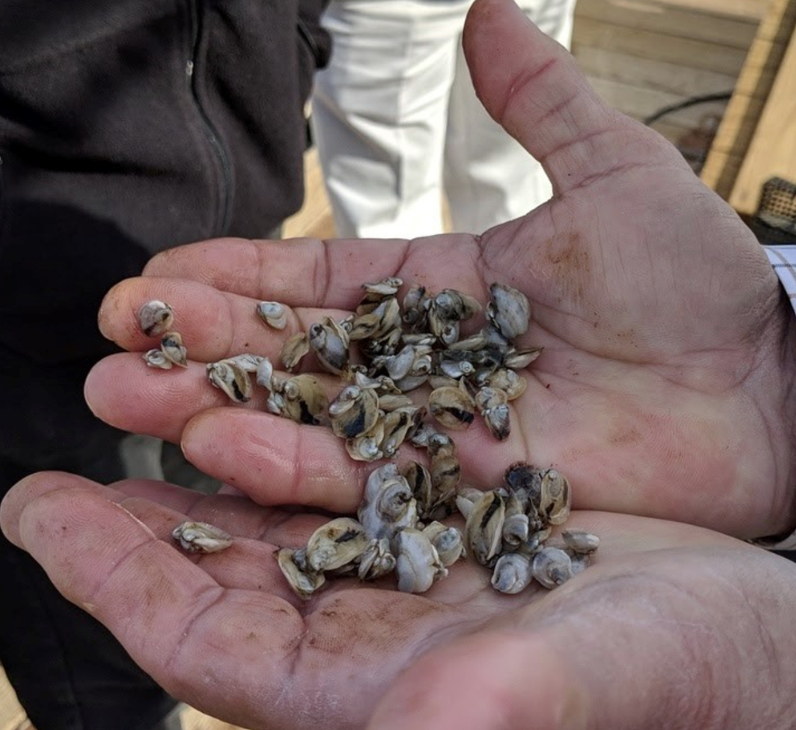


The Oyster Fisheries and Habitat Management Plan for the Pensacola Bay System is the first of its kind in Florida that integrates the needs of oyster fisheries (wild harvest and aquaculture) with the need to deliver ecosystem services and benefits provided by natural oyster habitat. Read the Plan Summary here.
For more information continue reading or contact Anne Birch, Florida Marine Program Manager at The Nature Conservancy.

The Plan was developed by a community Stakeholder Working Group, convened by The Nature Conservancy in Florida, and professionally facilitated by Facilitated Solutions LLC. The Working Group was composed of individuals from throughout the Pensacola Bay System (PBS) who represented the oyster fishery, oyster aquaculture, recreational fishing, county and state agencies, business, environmental and university interests. Working group members evaluated all components of the Plan using the best available science, data, and decision-support tools for management and restoration of the PBS and achieved 100% consensus on the final Plan.
The Plan is being integrated with the Pensacola and Perdido Bays Estuary Program process to develop a Comprehensive Conservation and Management Plan. Implementation of the PBS Oyster Plan will be guided through an oyster subcommittee composed of members of the Stakeholder Working Group and others in the community and led by the Pensacola and Perdido Bays Estuary Program. This process ensures the Plan is put into action through a cooperative, adaptive, ecosystem- based approach.
The eastern oyster (Crassostrea virginica) is an important fishery with deep roots in the cultural history of many coastal communities in Florida and beyond. Oyster reefs are recognized as one of the most imperiled marine habitats globally and throughout the U.S, having declined by 85%, or more, in many places worldwide (Beck et al. 2011), including Florida and the Greater Pensacola Bay System – Escambia, Pensacola, East and Blackwater Bays in Escambia and Santa Rosa Counties.
Oysters are unique among Florida’s fisheries and coastal habitats – they are a species, a fishery, and they also create habitat (reefs) that provide valuable ecosystem services. Beyond supporting the oyster fishery, oyster reefs are some of the most important ‘fish making’ habitats in the world – providing habitat and food for a variety of birds, animals and recreationally and commercially important fish, they help protect shorelines and reduce erosion, improve water quality, and remove nitrogen (denitrification).
Oysters face challenges – from changes in water quality and quantity, diseases, and natural and man-made disasters, to unsustainable harvest levels, fishing techniques, and other pressures. Florida does not have a comprehensive oyster management plan that governs management of the state’s oysters as a fishery and/or habitat. Recovery of oysters must address the whole resource that integrates the needs of the environment, economy, and community. Collaboration among resource managers, harvesters, aquaculturists, and other stakeholders is essential to the long-term viability of oysters as a fishery and a habitat that underpins many coastal communities.
The State of Florida is championing the development of plans at the bay scale to provide a path forward for recovery of oysters. Management at the bay scale is a sound approach since each bay has a unique oyster population, environmental conditions (e.g., salinity, water quality, substrate), fishing industry, and community character. Adoption of an ecosystem-based fisheries management approach will shift the existing management regime of oysters from unsustainable single-species management to an approach that considers the needs of the fishery and habitat in the context of the ecological, economic and social interactions of the region. The PBS Oyster Plan can serve as a model for future oyster management plans in other estuaries throughout Florida.
Download the GPBS Oyster Working Group Stakeholder Assessment


Download the GPBS Oyster Working Group Meeting Schedule & Workplan here
Download the GPBS Oyster Working Group Meeting I Summary here
Download the GPBS Oyster Working Group Meeting II Summary here
Download the GPBS Oyster Working Group Meeting III Summary here
Download the GPBS Oyster Working Group Meeting IV Summary here
Download the GPBS Oyster Watermen Workshop #1 Summary here
Download the GPBS Oyster Working Group Meeting V Summary here
Download the GPBS Oyster Working Group Meeting VI Summary here
Download the GPBS Oyster Working Group Meeting VII Summary here
Download the GPBS Oyster Watermen Workshop #2 Summary here
Download the GPBS Oyster Working Group Meeting IX Summary here
Download the GPBS Oyster Working Group Meeting X Summary here
Download the GPBS Oyster Working Group Meeting XI Summary here
Download the GPBS Oyster Working Group Meeting XII Summary here
Download the GPBS Oyster Working Group Meeting I Agenda Packet here
Download the GPBS Oyster Working Group Meeting II Agenda Packet here
Download the GPBS Oyster Working Group Meeting III Agenda Packet here
Download the GPBS Oyster Working Group Meeting IV Agenda Packet here
Download the GPBS Oyster Working Group Meeting V Agenda Packet here
Download the GPBS Oyster Working Group Meeting VI Agenda Packet here
Download the GBPS Oyster Working Group Meeting VII Agenda Packet here
Download the GPBS Oyster Working Group Meeting VIII Agenda Packet here
Download the GPBS Oyster Working Group Meeting IX Agenda Packet here
Download the GPBS Oyster Working Group Meeting X Agenda Packet here
Download the GPBS Oyster Working Group Meeting XI Agenda Packet here
Download the GPBS Oyster Working Group Meeting XII Agenda Packet here